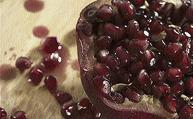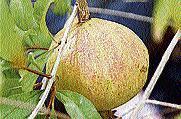
My sweetheart, my bride, is a secret garden, a walled garden, a private spring, there the plants flourish. They grow like an orchard of pomegranate trees and bear the finest fruits. (Songs of Solomon 4.12-13.)
The pomegranate tree has been a mystical plant for ages. The fruit has been used as an important insignia on the robes of High Priests in ancient times. An intriguing myth still stands that this tree is planted in home gardens becomes 'the guardian' of the home and that such a household will never be in want.
The tree is widely cultivated in Southern Africa and it is found in many gardens in Jamaica including mine. The fruit consists of many sacs filled with a very juicy pink or reddish pulp. Each sac contains a seed. It is very rich in vitamins C, E, B6, B1, B2, and niacin. The minerals potassium, copper and iron are also abundant in the juice which is considered a potent antioxidant.
Uses of the fruit


The leaves and bark of the roots are used to expel worms. It is excellent for hypertension because it is rich in potassium, and also beneficial for the heart as a cardiac nutrient because of its flavonoids.
Pomegranate is also excellent for gout and arthritic conditions, and for those who want to lose weight. The bottled pomegranate juices are now on the supermarket shelves and the juice is excellent for excess stomach acid and in reducing inflammation of the lining of the stomach and intestinal cramps.
My elders told me that they used the leaves of the pomegranate as a tea for diabetes (though this has not yet been proven scientifically). The leaves are collected, cleaned and dried, then a teaspoonful of the dried leaves used in a cup of boiling water. It is also used for diarrhoea and prostate cancer.
Helps the prostate
I took it upon myself to use this fruit on a family member who was recently diagnosed with prostate cancer. I gave him eight ounces of the juice daily along with a transformational diet, that is, eliminating certain foods from his diet, for three months along with the prescribed injection he received from his doctor.
It was amazing that within the three months, his prostate specific antigen (PSA) level moved from seven to 0.4. Then, I received a journal with research on the potential therapeutic effects of pomegranate juice on prostate cancer; it indicated that the juice was given to men with rising PSA levels following surgery or radiation for prostate cancer. The research shows significant reduction in the men's PSA levels. These studies are still continuing to date.
Dr. Diane Robertson is a pharmacist and recipient of an honorary doctorate in complementary medicine for her work in herbs; email: yourhealth@gleanerjm.com.
